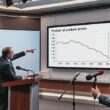German companies are significantly curtailing their hiring plans, signaling a deepening economic slowdown and raising concerns about the resilience of the national labor market. The latest Employment Barometer from the Munich-based Ifo Institute, a key indicator of business sentiment, registered a decline to 92.5 points in November, down from 93.5 points the previous month. This erosion underscores a wider trend of businesses actively reducing payrolls, a development described by Ifo’s Head of Surveys, Klaus Wohlrabe, as “weakening labor market development” driven by an “hesitant economy.
The downward pressure is particularly pronounced within the industrial sector, where personnel reductions persist across nearly all industries. While service providers initially experienced a brief period of cautious optimism last month, they are now demonstrably tightening their hiring plans, especially within the hospitality sector. This contraction in hospitality jobs reflects broader anxieties surrounding consumer spending and inflationary pressures impacting the leisure and tourism industries.
A notable exception to this bleak picture is the legal and tax advisory sector, which plans substantial hiring. This suggests a potential shift in demand towards specialized services, possibly linked to complex regulatory landscapes or burgeoning corporate restructuring. However, even this positive signal is tempered by the performance of the retail sector; despite the anticipated boost from the upcoming holiday season, retailers are projecting a reduction in workforce numbers, hinting at persistent challenges in consumer demand and supply chain uncertainties.
The construction industry presents a slightly more nuanced viewpoint, witnessing a modest increase in labor requirements – marking the highest Barometer reading since May 2022. However, experts caution that this uptick might be temporary, driven by specific project timelines rather than a sustained recovery in overall construction activity. The continued contraction across major sectors raises questions about the government’s stimulus measures and their effectiveness in safeguarding employment, potentially fueling political debate about strategies to foster more robust economic growth and prevent broader job losses.





